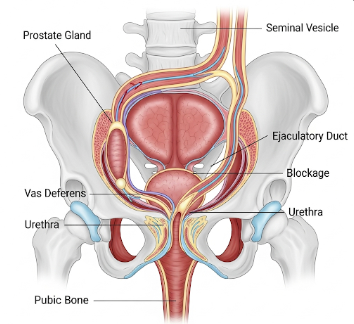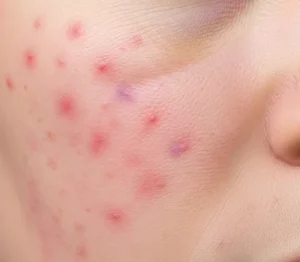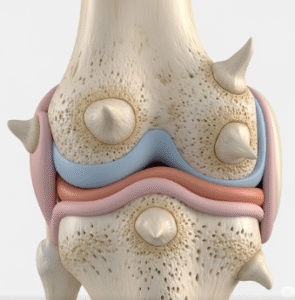Overview
Ejaculation problems refer to difficulties in achieving or controlling ejaculation during sexual activity. These issues can include delayed ejaculation, premature ejaculation, retrograde ejaculation, or anorgasmia (absence of ejaculation). Ejaculatory disorders can affect sexual satisfaction, relationships, and emotional well-being. Causes may be psychological, neurological, hormonal, or medication-related, and addressing them often requires a multidisciplinary approach. In Korea, urology and sexual health clinics provide comprehensive evaluation, counseling, and treatment options for men experiencing ejaculation problems.
Highlights:
➤ Includes premature, delayed, retrograde, or absent ejaculation
➤ Can impact physical, emotional, and relational well-being
➤ Often treatable with lifestyle changes, therapy, or medical interventions
Key Facts
➤ Prevalence: Premature ejaculation is one of the most common male sexual disorders, affecting up to 30% of men; delayed ejaculation is less common
➤ Age affected: Can occur at any age but often presents in adulthood
➤ Gender: Primarily affects males; ejaculatory disorders are male-specific
➤ Impact: Can cause relationship strain, anxiety, or decreased sexual satisfaction
➤ Prognosis: With proper evaluation and treatment, most men experience significant improvement
What are Ejaculation Problems?
Ejaculation problems encompass any dysfunction related to the timing, control, or ability to ejaculate. Major types include:
- Premature ejaculation: Ejaculation occurs sooner than desired, often before or shortly after penetration
- Delayed ejaculation: Difficulty achieving ejaculation despite adequate stimulation
- Retrograde ejaculation: Semen enters the bladder instead of exiting through the penis
- Anorgasmia: Inability to ejaculate, sometimes despite orgasmic sensation
Key characteristics:
- Timing issues: Ejaculation occurs too quickly or too slowly
- Volume changes: Reduced or absent semen
- Associated sexual dysfunction: Erectile problems, low libido, or orgasmic difficulty
Highlights:
➤ Can have physical, psychological, or combined causes
➤ Accurate diagnosis depends on patient history and evaluation
➤ Treatment is individualized based on type and underlying cause
What Symptoms Are Related to Ejaculation Problems?
➤ Premature ejaculation: Inability to control ejaculation, ejaculatory latency less than one minute in some cases
➤ Delayed ejaculation: Prolonged time to ejaculate or difficulty ejaculating
➤ Retrograde ejaculation: Cloudy urine after orgasm, low semen volume
➤ Anorgasmia: Absence of ejaculation despite sexual stimulation
➤ Associated psychological symptoms: Anxiety, frustration, embarrassment, and relationship tension
➤ Impact on fertility: Certain types, like retrograde ejaculation, may affect sperm delivery
Highlights:
➣ Symptoms vary depending on type and severity
➣ Early recognition improves treatment outcomes
What Causes / Possible Causes
➤ Psychological factors: Stress, anxiety, depression, relationship issues, or sexual trauma
➤ Neurological conditions: Spinal cord injury, multiple sclerosis, or nerve damage
➤ Hormonal imbalances: Low testosterone or thyroid disorders
➤ Medications: Antidepressants (SSRIs), antipsychotics, or blood pressure medications
➤ Urological conditions: Prostate surgery, infection, or obstruction
➤ Lifestyle factors: Alcohol abuse, substance use, or chronic illness
➤ Age-related changes: Older men may experience delayed ejaculation due to hormonal or vascular changes
Highlights:
➣ Causes may be psychological, physiological, or drug-induced
➣ Identifying the root cause is essential for effective treatment
When Should I See My Doctor?
➤ Persistent difficulty with ejaculation – Affecting sexual satisfaction or relationships
➤ Associated erectile dysfunction or libido changes
➤ Retrograde ejaculation – May be indicated by cloudy urine or low semen volume
➤ Fertility concerns – Inability to ejaculate affecting conception
➤ Psychological distress – Anxiety, depression, or relationship tension
Highlights:
➣ Early consultation with a Korean urologist or sexual health specialist ensures proper evaluation
➣ Timely management improves physical and psychological outcomes
Care and Treatment
➤ Lifestyle modifications: Reducing alcohol, avoiding recreational drugs, improving sleep, and stress management
➤ Behavioral therapy: Cognitive-behavioral therapy (CBT), sexual counseling, or couples therapy
➤ Medications:
- Topical anesthetics or selective serotonin reuptake inhibitors (SSRIs) for premature ejaculation
- Dopaminergic agents for delayed ejaculation
➤ Hormonal therapy: Testosterone replacement if deficiency is identified
➤ Surgical interventions: Rare, for structural causes or post-prostate surgery complications
➤ Regular monitoring: Track treatment response, ejaculatory timing, and semen analysis if fertility is a concern
Highlights:
➣ Treatment is highly individualized and often multimodal
➣ Combining medical, behavioral, and psychological strategies yields the best outcomes
Treatment Options in Korea
Medical Treatments:
➤ Urology clinics: Comprehensive sexual health evaluation, hormone testing, and semen analysis
➤ Prescription medications: SSRIs, topical anesthetics, or dopaminergic drugs based on the type of ejaculatory disorder
➤ Lifestyle counseling: Stress management, alcohol moderation, and exercise guidance
Advanced Procedures:
➤ Surgical interventions: Rare, but may include treatment for ejaculatory duct obstruction or post-surgical retrograde ejaculation
➤ Assisted reproductive technologies: Sperm retrieval and assisted fertilization for men with retrograde ejaculation or anorgasmia affecting fertility
➤ Follow-up care: Continuous monitoring of ejaculatory function, sexual satisfaction, and psychological well-being
Rehabilitation & Follow-Up Care:
➤ Education on sexual techniques, stress reduction, and communication with partners
➤ Regular monitoring for response to therapy and any medication side effects
➤ Multidisciplinary support for patients with psychological or systemic contributors
Highlights:
➣ Korean clinics provide advanced diagnostics, tailored therapy, and long-term support
➣ Early intervention ensures improved sexual health, relationship satisfaction, and overall well-being













